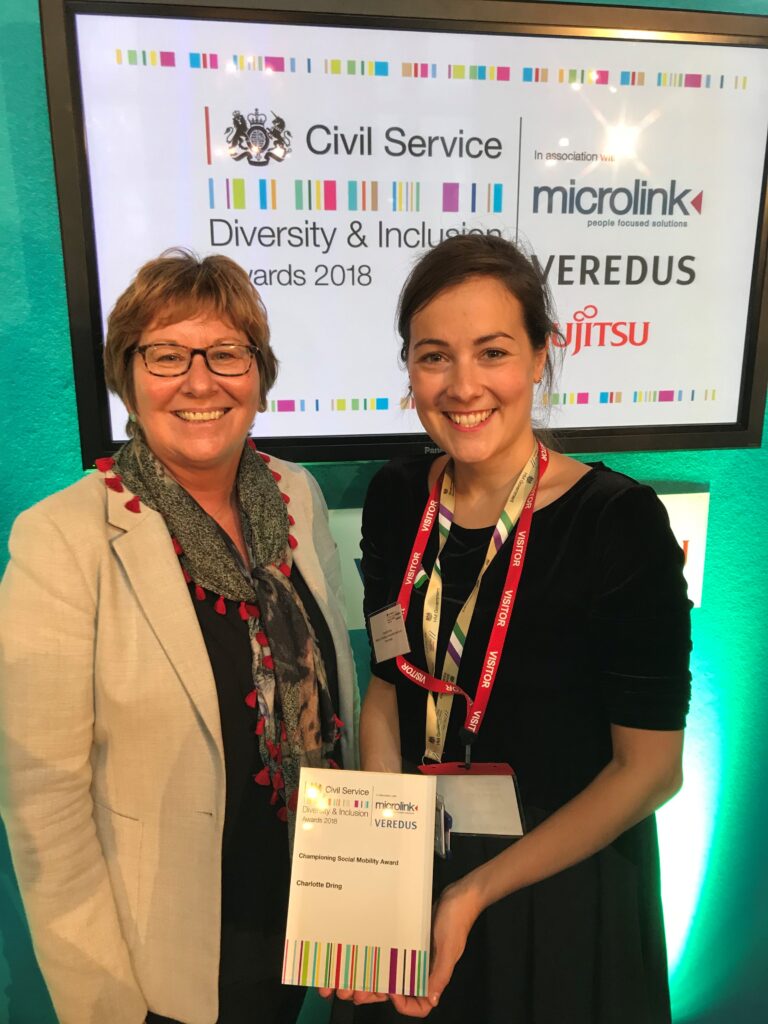
Since I took over from Jon Thompson as Social Mobility Champion earlier this year, I’ve been amazed and impressed by the enthusiasm and passion this subject inspires across the Civil Service.
Social mobility feels a bit like the new kid on the diversity and inclusion block. Earlier this month, I had the privilege of announcing Charlotte Dring as the Championing Social Mobility winner at the 2018 Civil Service Diversity and Inclusion Awards. Although this is the 12th year of the Awards, it’s only the second year we’ve had a social mobility category. The conversation about social mobility feels like it’s just getting started.

In part, I think that’s because people have been a bit uncomfortable talking about ‘class’. Unlike other aspects of diversity, it can feel more like looking back – to where we came from, or to an earlier era when these things seemed to matter more – than embracing a more inclusive future. We pride ourselves in the Civil Service on being truly meritocratic. So what socio-economic background (SEB) we came from shouldn’t be an issue, right?
Wrong. The Civil Service, and especially the Senior Civil Service, is still seen as elite and ‘not for us’ by many people from lower SEB backgrounds.
How things are changing
The good news is that Civil Service recruitment is changing. Fast Stream recruitment, for example, has changed enormously since the 1980s, when I can recall being asked to rank, in order of precedence, an earl, a duke, a viscount and a baron (no, me neither). But the Bridge Group Report in 2016 found that the Fast Stream intake was still less socially diverse than Oxford University.
We’re changing that. The Bridge Report recommendations have been implemented to improve Fast Stream diversity, and the Fast Stream Opportunity Network is doing great work with schools outreach and acting upon feedback from Fast Streamers from lower socio-economic backgrounds. But there’s still a huge amount to do across the whole Civil Service.
That’s why the work of the Cross Government Social Mobility Network that Charlotte helped to get started is so important. As is the work that many departments are now doing – on schools outreach in social mobility 'coldspots', strengths-based and regional recruitment, apprenticeships, support for care leavers, and so on.
Ground-breaking work
It was great to see eight Civil Service departments in the Social Mobility Foundation’s Top 50 Employers this year. The Ministry of Justice (MoJ) in particular, thanks to great leadership from Matthew Coates, Shaun McNally, and Drew Morris, is doing some fantastic and ground-breaking work to reach out to and support those from lower socio-economic backgrounds. So much so, that the Social Mobility Foundation awarded MoJ third place in its annual index of employers.
One of the interesting things about SEB is that it’s often invisible. In the past, lots of people – me included – have found it easier to ‘fit in’ to get on. So we dropped our regional accents (Brummie, in my case), started listening to Radio 4, and adopted the ‘right’ cultural reference points.
But conformity comes at a price – it’s wasted effort for individuals, and our teams and organisations lose the value that diverse socio-economic backgrounds bring. Charlotte speaks brilliantly about what this has meant for her. If we’re serious about bringing our whole selves to work, people shouldn’t have to do this.
Measuring SEB
Of course, in order to do better on social mobility across the Civil Service, we need to know our starting point. Earlier this year, we published recommendations on how employers can measure socio-economic background in their workforce, and we are committed to establishing a baseline for the Civil Service by March 2020. To do this, we need your help. We're piloting ways of collecting this information from you, on a voluntary and anonymous basis, including through this year's People Survey.
 So, if you are randomly selected to answer a few questions on your socio-economic background, please don’t be shy. This information will give us a great database, will assist us in making a better workplace for your colleagues, and help us ensure that people from all backgrounds can thrive in the Civil Service.
So, if you are randomly selected to answer a few questions on your socio-economic background, please don’t be shy. This information will give us a great database, will assist us in making a better workplace for your colleagues, and help us ensure that people from all backgrounds can thrive in the Civil Service.
If you want to get more involved, ask about your department’s networks, or connect with the brilliant Cross-Government Social Mobility Network. Gerri Clement and Nic Hanns – co-founders of the network with Charlotte – are the current chairs.
If you have any tips on improving social mobility within the Civil Service, please contact Gerri or Nic (geraldine.clement@justice.gov.uk and nicola.hanns1@dwp.gsi.gov.uk; or on Twitter @CGSMNet). You can also leave a comment below, or email the Diversity and Inclusion Strategy Unit: inclusion@cabinetoffice.gov.uk.

8 comments
Comment by Steve Cousins posted on
I have worked for MOD for thirty years, and in all that time nobody asked or cared about my socio economic background. All that mattered was did I have the qualifications, and could I do the job. Thus there was not, and could not be, any discrimination on that basis. As far as I am concerned, forcing people to reveal that information is the invitation to discrimination, effectively making it compulsory. Even if the intent is that information is used to help some disadvantaged group or other, it is still discrimination, positive or negative. For what is positive discrimination for one group is negative for another. If MOD and the Civil Service as a whole is serious about being a meritocracy, then merit alone should decide who gets where. What somebody's mother or father did for a job (in my case)forty five years ago is entirely irrelevant. This appears to be a bad case of virtue signalling; "look at us, we help the disadvantaged!"
Comment by Reggie Cyde posted on
The only minor detail left now is agreeing on what counts as meritorious.
Comment by Liam Crossley posted on
We should certainly be doing more to promote social mobility. However there are two glass ceilings which, with the best will intended, I think it would be difficult to eliminate. First, if one has had a lifetime of copious education funded by a generous inheritance, perhaps one is more likely to perform well in an entirely meritocratic recruitment process. It would be hard to win a race one started four miles back from one's competitors.
Second is the question of "known entities". The information available on a vacancy is stronger the closer one is to a position - word-of-mouth only travels so far. And you can only compete in those races known to you. The job becomes a known entity to potential recruits. And let's say crisis management demands that a conveniently placed employee be asked to act up temporarily. If that employee has proven themselves capable in that role, why should an employer look elsewhere? The employee becomes a known entity to the employer. Even name-blind recruitment cannot eliminate bias introduced by known entities.
Comment by Jo posted on
Hi Liam,
I've read some interesting stuff on recruiting people looking at where they started from/the barriers they faced rather than just what they acheived. Done correctly this is more truely meritocratic because it looks at what people acheive in overcoming obstacles including those relating to social and economic background.
Comment by Kelly Pendergast posted on
Really good to read how we are driving this forward (and celebrating this). It is important that we are confident and proud about what we as individuals bring to the table (regardless of background and circumstances) and in doing so we will attract and work with the very best.
Comment by Jo Taylor posted on
This is great and should be provided at the point people are asked to answer socio economic questions
Comment by Louisa Radice posted on
Here's my confession: I went to a private school and have a postgraduate degree from a Russell Group university but I have never risen above an entry-level position and now earn less than what my mother did over 20 years ago. Am I doing my bit for downward social mobility? At least no-one can accuse me of dominating any professions.
Comment by Pat Lavery posted on
The Civil Service will never truly be a socially mobile organisation as long as the vast majority of senior management jobs are located in London at the expense of the rest of the UK. Not everyone can commute to or wants to live in London. This is a real barrier to staff outside the Whitehall bubble looking for progression to the highest levels of the civil service.
Since the Lyons Report in 2004, some departments, most notable the Met Office have re-located posts outside London but these have been mainly operational/customer contact roles in the more junior grades. Advances in electronic communications now make it entirely feasible for departmental head offices with the possible exception of ministerial private offices, to be located anywhere in the UK. In fact, there need be no single location for head offices as it is entirely possible for these to be spread across a number of sites with good e-comms. links to allow for virtual meetings, etc.
If the Civil Service is serious about social mobility then the Cabinet Office should set targets for Government Departments to re-locate more senior jobs outside London. At the very least, more SCS vacancies should be advertised as being flexible location wise.